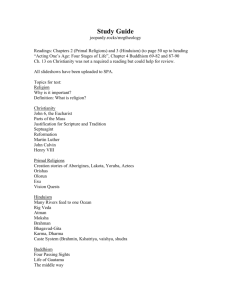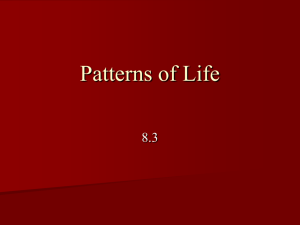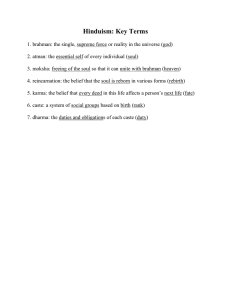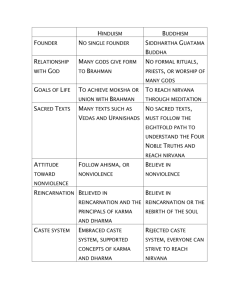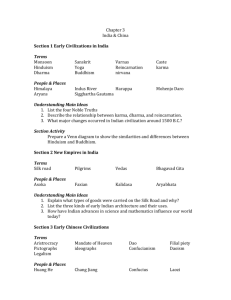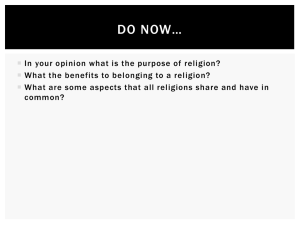31
advertisement
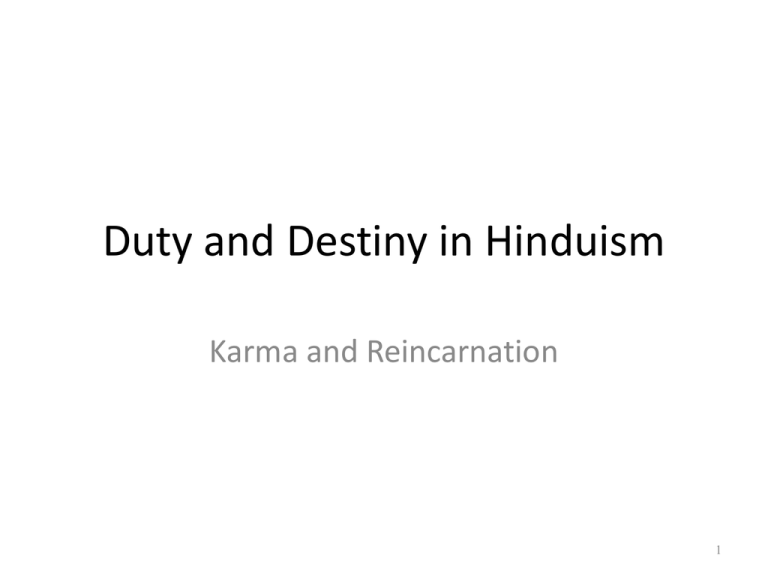
Duty and Destiny in Hinduism Karma and Reincarnation 1 Outline • 1) Ethical Dilemma of Kinship Society: India and Greece • 2) Argument for immortality • 3) Karma, Duty (Dharma), Reincarnation • 4) Two approaches to Karma 2 • • • • “Better to live on beggar’s bread With those we love alive, Than taste their blood in rich feasts spread And guiltily survive!” 3 Alternate translation • 5. Better to live in this world even on alms than to slay these high-souled Gurus. Slaying these Gurus, I should taste of blood-stained enjoyments even in this world. • 6. Nor do I know which for us is better, that we should conquer them or they conquer us, - before us stand the Dhritarashtrians, whom having slain we should not care to live. 4 Historical context: Greece v. India • Compare with Antigone: brother kills brother without apparent regret • Greek warrior does not flinch at war between kin. – New arena of action: the legal state – Kinship duty survives only with woman’s duty to bury the dead. • Indian warrior Arjuna is deeply concerned about kinship: – He is intimately connected with neo-kinship system • Legal state of Greece; neo-kinship state of India 5 Krishna’s Reply • 12. It is not true that at any time I was not, nor thou, nor these kings of men; nor is it true that any of us shall ever cease to be hereafter. • 13. As the soul passes physically through childhood and youth and age, so it passes on to the changing of the body. The self-composed man does not allow himself to be disturbed and blinded by this. 6 The transience of matter • 14. The material touches, O son of Kunti, giving cold and heat, pleasure and pain, things transient which come and go, these learn to endure, O Bharata. • 15. The man whom these do not trouble nor pain, O lion-hearted among men, the firm and wise who is equal in pleasure and suffering, makes himself apt for immortality. 7 Being and Non-being • 16. That which really is, cannot go out of existence, just as that which is non-existent cannot come into being. The end of this opposition of 'is' and 'is not' has been perceived by the seers of essential truths. • 8 Immortality • 17. Know that to be imperishable by which all this is extended. Who can slay the immortal spirit? • 18. Finite bodies have an end, but that which possesses and uses the body is infinite, illimitable, eternal, indestructible. • Therefore fight, O Bharata. 9 The true Self does not die • What is killed is not the true Self, but the shadow, the illusion – which does not really exist anyway. – Recall Plato’s cave • The true Self is eternally linked with the Self of others: this is the true (spiritual, philosophical) meaning of kinship. – Plato: the part of us that recognizes immortal truths must also be immortal 10 Do your duty and fight! • Do your duty (Dharma) as a warrior prince – your destiny in this life as determined by your caste duties – Compare Socrates: his duty is to follow the law • Without attachment to consequences (joy over victory, sorrow over deaths etc.) – Get off the emotional rollercoaster 11 Philosophical Argument • Krishna does not present these ideas as dogma that must be accepted on his authority – It is not because the gods say so that it is true • He presents a rational argument for these positions – The gods say it is true because it really is true – And so we should be able to understand it by our own reasoning • As an iron age society – India has the experience of republican government: people creating their own societies – And so thinking for themselves 12 (1) Being 1. Being cannot come out of non-being 2. If once there was nothing at all, now there would be nothing. 3. Hence being is eternal 13 (2) Non-Being 1. Inasmuch as anything is not, it cannot be. 2. Nothing can come out of nothing. 3. Non-being is nothing and can never become anything 14 (3) That which changes 1. Changing beings seem to be a mixture of being and non-being 2. Changing things come into being from what they no longer are and pass away into what they are not yet. 3. Change includes both “is” and “is not,” being and non-being 4. But only being is; non-being is nothing! 5. So change is an illusion! (Maya) 15 (4) Who/what are you? • Who are YOU really? A changing being? 1. You were a baby but are not one now 2. You will be an old woman, but are not this yet. 3. As an old woman you will no longer be what you are now. 4. Are YOU these changing forms that you tend to identify with? 16 (5) Illusion of these fleeting forms • Inasmuch as I am a changing being of time, I am focused on past and future, which do not exist. • This mental attitude involves us in Maya (Illusion) • China: This is the realm of Yin/Yang duality of Daoism • My true being is in the present moment of Now, of Being, the moment of I AM • The Dao is the one before the two • Inasmuch as I AM, I AM Eternal, Divine 17 (6) Practical Conclusions 1. Focus therefore on what you must do NOW, your duty in the reality of present Being, not on illusory ideas of past and future. • The Way (Dao) for you is determined by your Duty (Dharma) 2. Don’t dwell on possible future consequences, which exist now only as imaginings in your mind. 3. Discover your true, immortal Self as a basis for action 4. This is not about contemplation but action (karma = action) 18 Higher Concept of Karma/Action • 1) Debased conception of action/Karma as justification of caste system – Why are you poor? Why are you born into a lower caste? – =punishment for past life sins • 2) Hindu Vedanta Philosophy: Higher conception of Bhagavad-Gita 19 Karma • 1) (Bad) Karma: Action that attaches to consequences – Full consequences unfold over many lifetimes • 2) Alternative: Action without negative karma because detached from outer consequences • => Freedom from wheel of birth and death 20 Why is someone in a lower caste? • 1) because of choices in a previous life? • 2) because one is a devoted soul who wishes to spread joy and light in these conditions? – A Saint or Avatar: Like Buddhist Bodhisattva • 3) Recall Ulysses’ reason for choosing a modest lifetime. • Therefore: do not judge from appearances. 21 Higher meaning of Caste • Four types of personalities from the God-Man Purusha: all should be honored • 1) Brahmin: People focusing on higher spirituality and/or intellect (head) • 2) Kshatriya: People engaged in organizing life and enforcing law and order (arms) • 3) Vaishya: People interested in facilitating good relations with others (legs) • 4) Sudra: People involved in meaningful work (feet) 22 “Bad” Karma • • • • Not punishment but experience 1) I choose to experience what wealth means 2) But there is no wealth without poverty 3) Therefore to experience wealth, I must also experience poverty – So the poor person may have been rich in a previous life – Or will be so in the next one 23 Karma and Duty/Dharma • Karma: letting external consequences decide one’s action – You always experience the full consequences of your actions • Duty—Dharma: Action without concern for consequences: – acting on the basis of duty coming from your inner Self or true nature 24 Historical Context of Hinduism • 1) Re China: kinship persists – The divine is in nature, is nature (animism) – The Dao is the no-thingness that unites all things • 2) Re Greece and Rome: freedom of iron age peasant is affirmed and lost – The human individual is essentially free – But loses his/her freedom>Stoicism • 3) India: Animism + Freedom + Diversity 25 1) Animism • The divine is not a separate reality outside the world – No separation of God and Human: advaita vedanta • It exists all around us • And in us: it is our true nature – Our body is the “avatar” of our true, divine spirit – Recall film “Avatar” 26 2) Freedom • We create our own lifetimes according to the inner logic of our own actions • When we experience seemingly negative circumstances, this is because we have chosen this as part of our evolution • Thus we remain free even in apparent unfreedom • = Teleology! 27 3) Diversity • There are multiple paths of development • 4 main types of experience (spiritual meaning of caste) • Multiple forms of experiences 28 All Deities Express One God: Brahman • “Nay, and of the hearts that follow other gods • In simple faith, their prayers arise to me, • O Kunti’s son, though they pray wrongfully.” 29 Adaptation to diversity • “In order to pacify the tribals, their gods might be incorporated into the array of gods worshiped in the temple by the priests, just as the tribal peoples would begin to worship the major gods of Hinduism.” Spodek, 270 30 Trimurti (Hindu Trinity) and Avatars Brahman (Divine Nature) Brahma (as Creator) with Saraswati (Knowledge) Vishnu (as Preserver) with Lakshmi (Love) Shiva (as Destroyer) with Kali (Transformation) or Parvati Gods and Goddesses Human Avatars Krishna with Buddha Radha Arjuna, and YOU--when enlightened Ganesh 31 Krishna and Radha 32 Lord Ganesh 33

